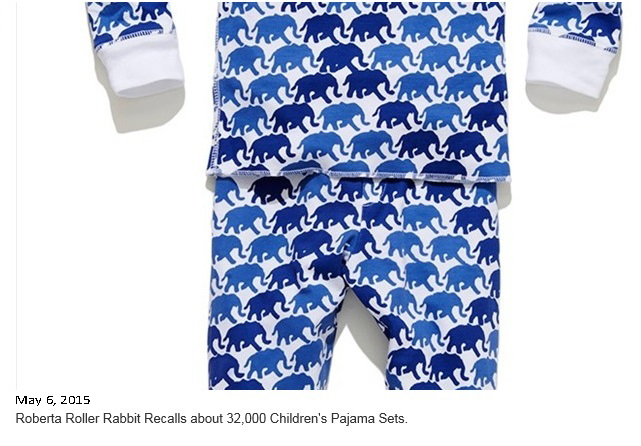How to find out if you have a recalled children's product and what to do
June 3, 2015 | Category: Child Injuries, Defective Products | ShareThe Washington Post reported in October 2014 that 2014 was the worst year ever for auto recalls with one in five U. S. autos and trucks at risk due to critical, and even deadly, defects. The news media has done a good job, through articles and news coverage, of notifying auto and truck owners of the dangers and what the automobile manufacturers are suggesting owners do in this situation.
Autos, trucks and other vehicles are identified and tracked through VIN (vehicle identification numbers). Other products, such as children's wear, do not have VIN numbers, but they do have tracking labels. Tracking labels are required for children's products that are designed or intended primarily for use by children ages 12 or younger. These tracking labels must be "distinguishing permanent marks". All tracking numbers should be visible, legible and must have the following:
- Manufacturer or private labeler name.
- Location and date of production of the product.
- Detailed information on the manufacturing process, such as a batch or run number, or other identifying characteristics, and
- Any other information to facilitate ascertaining the specific source of the product.
Kids in Danger (KID), the non-profit group founded in 1998 with the objective, "...to protect children by improving children's products' safety..." reports that two children's products are recalled every week, yet parents and other caretakers of children continue to ask, "Why don't I hear about them?" KID says that manufacturers rarely advertise recalls. They use press releases instead. Manufacturers, according to KID, report that they typically only retrieve 10 to 30 percent of the units being recalled. This means the other 70 to 90 percent of recalled units are still in use.
For durable infant or toddler products, such as highchairs and cribs, the CPSC (Consumer Product Service Center) requires an additional product registration card and packaging requirements. To improve recall effectiveness of durable infant or toddler products, Congress requires manufacturers to:
- Provide consumers with a postage-paid products registration card with each product.
- Maintain a record of the names, addresses email addresses and other contact information of consumers who register their products; and
- Permanently place the manufacturer name and contact information, model name and number, and the date of manufacture on each durable infant or toddler product.
The CPSC reports that the tracking label helps improve the effectiveness and response rates for future recalls. If a component of a product is identified as to the source of the hazard or violation, the tracking label assists in identifying any other products which may contain the same component.
 Working to protect children from the number one cause of death - unintentional injuries, there is also another not-for-profit organization known as Safe Kids Worldwide. The sole focus of this organization is on serious injuries to children. In 2014 almost one million children died worldwide as a result of serious injury. Experts believe that 35 percent of those children's dying were the direct, or indirect, result of unsafe products.
Working to protect children from the number one cause of death - unintentional injuries, there is also another not-for-profit organization known as Safe Kids Worldwide. The sole focus of this organization is on serious injuries to children. In 2014 almost one million children died worldwide as a result of serious injury. Experts believe that 35 percent of those children's dying were the direct, or indirect, result of unsafe products.
Here is a link to SafeKids.org were there are some details about 2015 children product recalls to date with suggestions as to how parents should handle the matter. Also, sign up for Children's Product Recall Alerts published twice monthly by Safe Kids Worldwide. The KID organization also has important information about children's recalled products.
Now that you know your child's product has been recalled, what do you do? Below are some steps you may follow from KID:
1.) Follow the remedy listed on the recall summary. You will either get a refund, a replacement, or a repair.
2.) Stop using the product even if you think ‘that will never happen to me/my child’ many people do not even hear about recalls, and when they do, many either ignore the warning or attempt homemade repairs. The vast majority of parents who have children that have either been injured or killed by unsafe, recalled products never thought that would happen to them.
3.) Share with others to help spread the word. Children’s products are recalled often (2-3 times per week) but very few people actually hear about these recalls. This is because the manufacturer’s commitment to marketing the product differs greatly from their marketing of the recall. Help get the word out by sharing the recall on social media or by printing and posting KID’s monthly recall digest poster.
"Keeping children safe from defective products is important to our firm. If your child has been injured as the result of a defective product, contact Spivey Law Firm, Personal Injury Attorneys, P.A.," said Fort Myers Defective Product Attorney, Randall Spivey.
Fort Myers Defective Product Attorney, Randall L. Spivey is a Board Certified Trial Attorney – the highest recognition for competence bestowed by the Florida Bar and a distinction earned by just one (1%) percent of Florida attorneys. He has handled over 2,000 personal injury and wrongful death cases throughout Florida. For a free and confidential consultation to discuss your legal rights, contact the Spivey Law Firm, Personal Injury Attorneys, P.A., in Lee County at 239.337.7483 or toll free at 1.888.477.4839,or by email to Randall@SpiveyLaw.com. Visit SpiveyLaw.com for more information. You can contact Spivey Law Firm, Personal Injury Attorneys, P.A.in Charlotte County at 941.764.7748 and in Collier County 239.793.7748.

